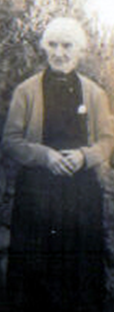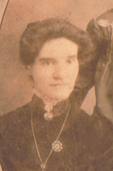 Katie McDermott, née Nolan (1873-1964)
Katie McDermott, née Nolan (1873-1964)
I had 13 grandaunts and 18 granduncles – 31 in all – but only four of them were still alive when I was born. It seems that grandaunts and granduncles have gone out of fashion with Irish people. They’ve been supplanted by great-aunts and great-uncles. Why has this happened?
I met two of my grandaunts when I was very young. During my summer holidays I was brought to visit them in the upstairs sitting-room of the house in which they were lodgers. We called them Aunt Katie and Aunt Aggie, but they were my grandaunts, my mother’s aunts and my grandmother’s sisters. Katie was born in 1873 and Aggie in 1887, but they seemed equally ancient to me, with white hair and long dark, old-fashioned clothes. I thought I had been on a number of such visits but looking at the facts now that can’t be true. The visit I remember cannot have been later than the summer of 1964, when I was turning five, because Katie died in December 1964.
Why is that unremarkable visit etched in my mind? Maybe meeting those two old ladies from a bygone age was one of the things that ignited my love of the past. As I expanded my interest in family history over the next decade I was told the names of many relatives from early generations on each branch of my ancestry. They included many of my grandaunts and granduncles, as well as great-grandaunts and great-granduncles. That’s what such relatives were called in Ireland back then.
That’s what such relatives are still called in Ireland. But more and more frequently I’m encountering people who self-consciously refer to their ‘great-aunts’ and ‘great-uncles’. Why is this? Maybe there is less connection between generations now and people are unfamiliar with such relationships. Or maybe they think it’s posh to say ‘great-uncle’. Certainly great-aunts and great-uncles are popular in more affluent English circles, and they get a lot of television exposure from the likes of Who Do You Think You Are? However, they don’t hold sway with everyone in England – a colleague with a background in Yorkshire uses ‘grand’ rather than ‘great’.
Dictionaries, if they mention them at all, will usually give ‘great-aunt’ and ‘grandaunt’ as alternatives. However, I’m saddened by the New Oxford Dictionary from Writers and Editors omitting grandaunt, granduncle, grandniece and grandnephew, while populating its pages with all the equivalent ‘greats’. Getting back to ‘great-aunt’, it is long established in many other English-speaking countries. But to me it’s illogical and inconsistent with other relationship terms. Why would my grandmother’s sister be my great-aunt instead of my grandaunt? Go back a generation and my great-grandmother’s sister is (quite rightly) my great-grandaunt. Unfortunately, there are people who would call my great-grandmother’s sister my great-great-aunt! That’s a step beyond!
The English language is rich in alternative words because of its inheritance from Germanic and Latin roots. The word ‘great’ was in Old English before the Normans brought ‘grand’ with them from France. Having ‘aunt’, ‘grandaunt’ and ‘great-grandaunt’ as genealogical terms helps to differentiate between the immediate generations in a family. I see no good reason to collapse the structure by removing the second layer.
On the recent Irish series of Who Do You Think You Are? I was glad to hear Pat Shortt several times referring to a granduncle. Adrian Dunbar did so too, though he alternated between the two terms as if he was unsure if great-uncle was the correct thing to say.
My gripe-of-the-day stems from a concern for tradition. Irish people traditionally have had grandaunts and granduncles, regardless of what such relatives have been called elsewhere. Let’s not lose touch with the past while digging into it. Hold on to your grandaunts and granduncles. They’re part of your heritage.

